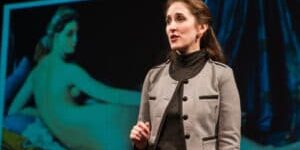Parody, by definition, speaks with two voices – that of the parodist, and that of its target – the former always subverting the latter by an act of redirecting the text from its original context to one more compromising. It implores us to consider its subject through a different lens, one that reframes it in a way that appeals to our common sense and critical judgment. The Ultimate Stimulus, Felipe Ossa’s offering in this year’s NY International Fringe Festival does just that, skewering our contemporary obsession with new “genius” ideas, as presented in the quintessential new-age-genius forum, the TED talk. Ossa pokes fun not just at the ideas themselves, but at all the tropes that we have come to associate with their presentation – the animated bubble charts, the tech-savvy terminology, the reliance on “network models” and, of course, the gratuitous acronyms and buzzwords.
The “Ultimate Stimulus” presentation is given by “renegade economist” Amanda McCloud (Tanya O’Debra) a 21st century thought-leader who has a plan to correct America’s most pressing problem, income inequality. Equipped with an arsenal of convoluted charts and statistics, McCloud kicks off the talk with an assessment of America’s income divide, which is so out of control that it “beats the height of excess during the roaring twenties.” In fact, she asserts, “This is pre-revolutionary France.” This leads McCloud to her revolutionary solution, “a system of culturally-sanctioned master and concubine relationships.” Concubinage, as McCloud calls it, is a quasi-feudal system of sexual patronage in which a person in financial need (cliebkin) may enter into a contract with a member of the elite super-rich (vole) as his or her sexual plaything. McCloud then utilizes the remainder of her presentation to show us how this would work from an economic perspective, walking us through a series of hilarious hypothetical situations with “typical” people. In one case, a down-and-out married restaurant cook named Manuel, meets his sexual mentor via a matchmaking website called “Equal Hearts” where he catches the fancy of none other than Christy Walton, the widow of Walmart founder John Walton, one of the ten richest women in the world. After some digital foreplay on the site, Christy and Manuel enter into a 5-year TTM (Two-Tiered Marriage) and Manuel moves his wife and 2 kids into a cliebkin village on the Walton estate.
Tanya O’Debra is brilliantly funny as McCloud, not flagging for a moment in her 45-minute monologue, and burns through Ossa’s Swiftian script headlong, oozing yuppie smarminess, and punching every comedic moment while maintaining utter believability. She perfectly embodies the persona of the 30-something, modern professional female, complete with a baby-bump that she subtly caresses whenever she mentions the nourishing cliebkin/vole relationship.
But to say this is a one-woman show is to ignore the fact that what we’re really watching is a duet between Ms. O’Debra and her co-star, the 12-foot projection screen that looms behind her, providing the punch lines to many of the show’s funniest moments. Like Stephen Colbert’s “The Word,” we’re watching postmodern parody in action, the anthropomorphizing of technology to the point that the machine becomes the foil of a vaudevillian comedy routine. The slides are such an integral part of the text, in fact, that they even provide the subtitles as O’Debra performs Manuel’s hypothetical dialog with his hypothetical wife – in Spanish. Taking on the task of maintaining a dynamic, comic dialog with an inanimate object would be a challenge to any actor, but under the competent direction of Sara Wolkowitz, O’Debra strikes the perfect balance between taking stage and giving focus to the slides. If we linger a bit longer than we should on a visual, it’s due only to the sheer difference in size between the enormous projection and the comparatively diminutive actress – and perhaps, just a little, to our collective addiction to gazing upon the electronic oracle. Fortunately, O’Debra has enough charisma and skill as an actor to pull our attention right back to her when needed.
Still, for all its sharp writing, energy and humor, I found myself craving a narrative. I wanted this show to take me on a journey, to arrive somewhere different than where it started, and I’m not sure we ever got there. Perhaps we’re not meant to – perhaps the ultimate vindication of Mr. Ossa’s script is that it mirrors its subject so well that the line between theatre and TED talk, between satire and subject, is indelibly blurred. I would love to see this work performed at an actual TED event, as a public intervention, as comedian Sam Hyde did at Drexel University last year. After all, one could say that TED talks themselves never get anywhere, that they are simply an exercise in narcissism, an ego-stroke for the modern professional, allowing anyone to be an “thought leader.” And at the end of the day, how many of those “revolutionary” ideas do we embrace, how many actually cause paradigmatic shifts, how many change the world? Exactly. Maybe that’s the point.
The Ultimate Stimulus. Saturday August 23 at 3PM. Celebration of Whimsey (21a Clinton Street, NYC). Ends Saturday, August 23rd. http://www.fringenyc.org
